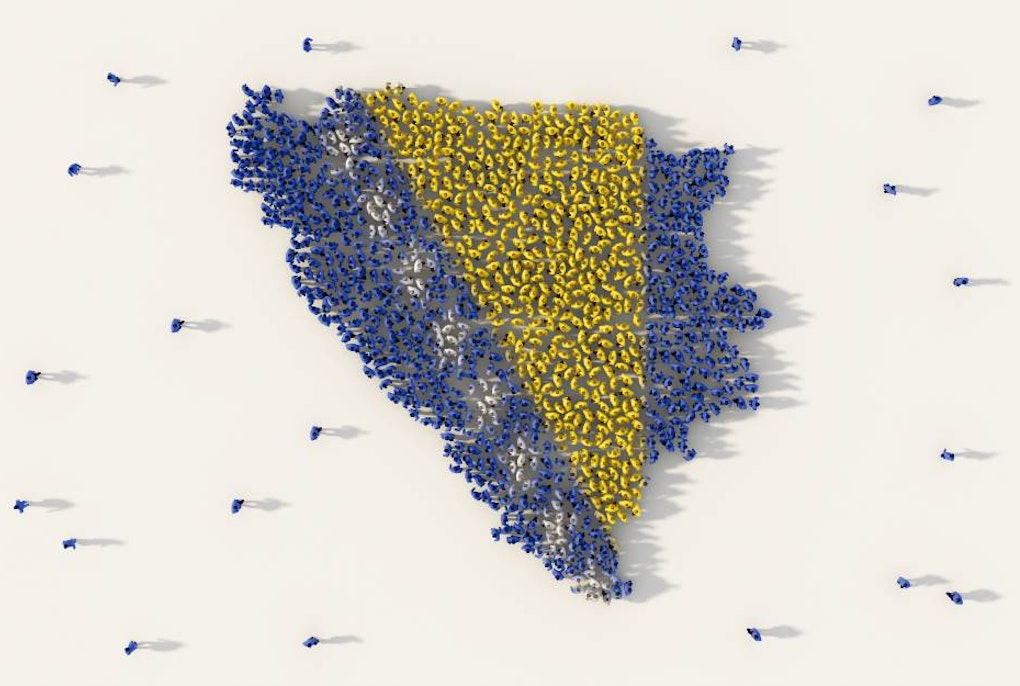
Bosnia and Herzegovina Approaching European Union Membership
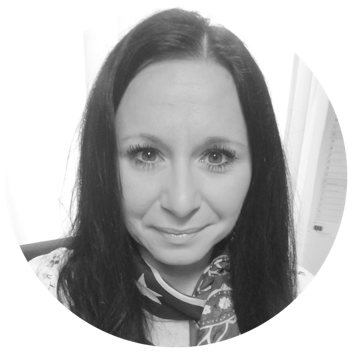 Maja Sahadzic
Maja Sahadzic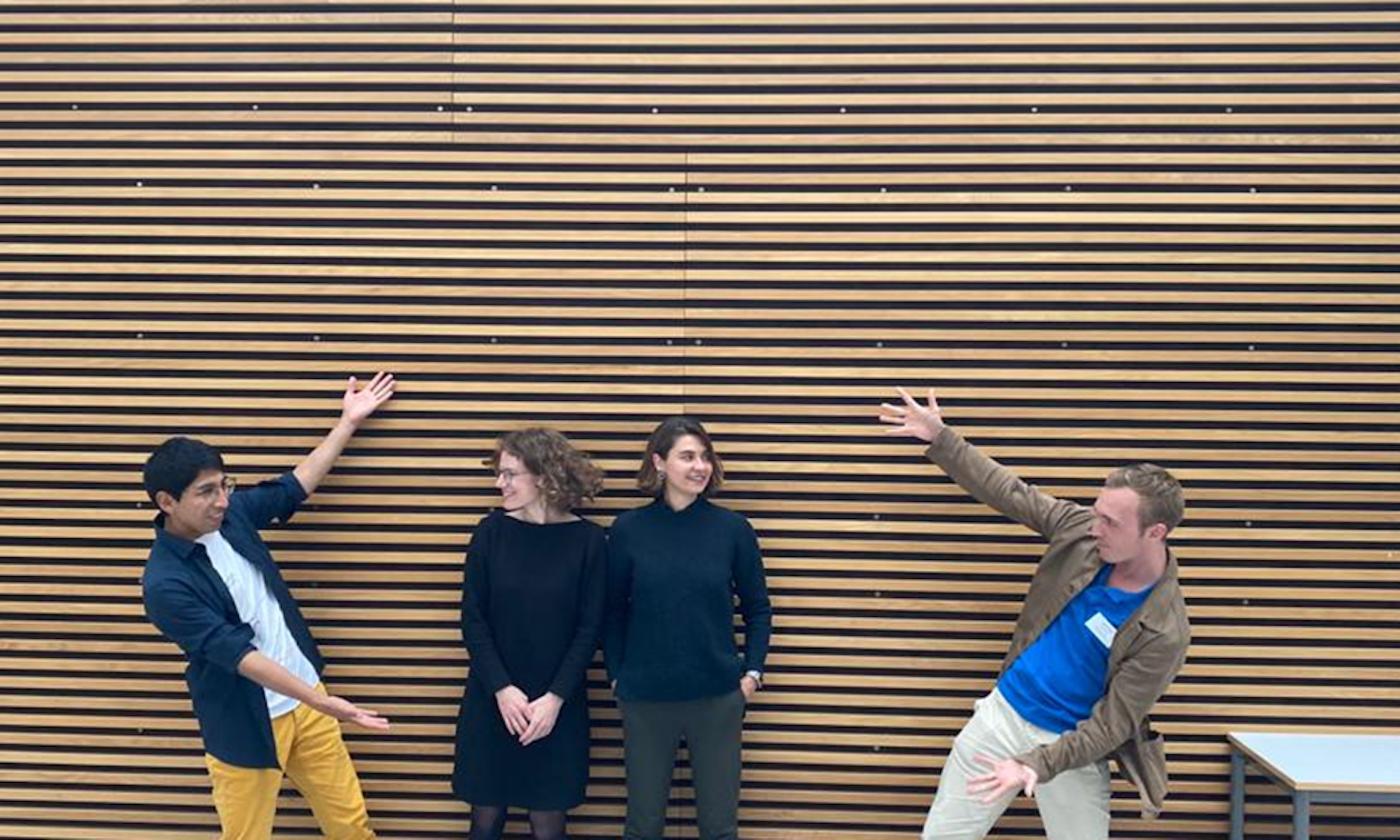
Have you ever been asked about your research and found yourself lost in a never-ending labyrinth of explanations? Trust me, you're not alone. As academics, especially Ph.D. students, we can get so caught up in our scholarly quests that we forget how to speak effectively with different crowds. We become fluent in jargon, details, mechanisms, and theories that make perfect sense to our fellows but sound like gibberish to anyone outside our little academic bubble.
Doing a Ph.D. means diving headfirst into an abyss of knowledge, staking your claim in a teeny-tiny unexplored realm that others have yet to conquer. We, ambitious Ph.D. students, often dream of revolutionizing our fields with our groundbreaking research, but let's face it, those groundbreaking moments are rarer than finding that missing quote you swear to God you saw in a paper (but forgot to take notes!). In reality, our contributions are more like adding a very thin layer to the already existing knowledge of the field. The following picture illustrates this perspective:
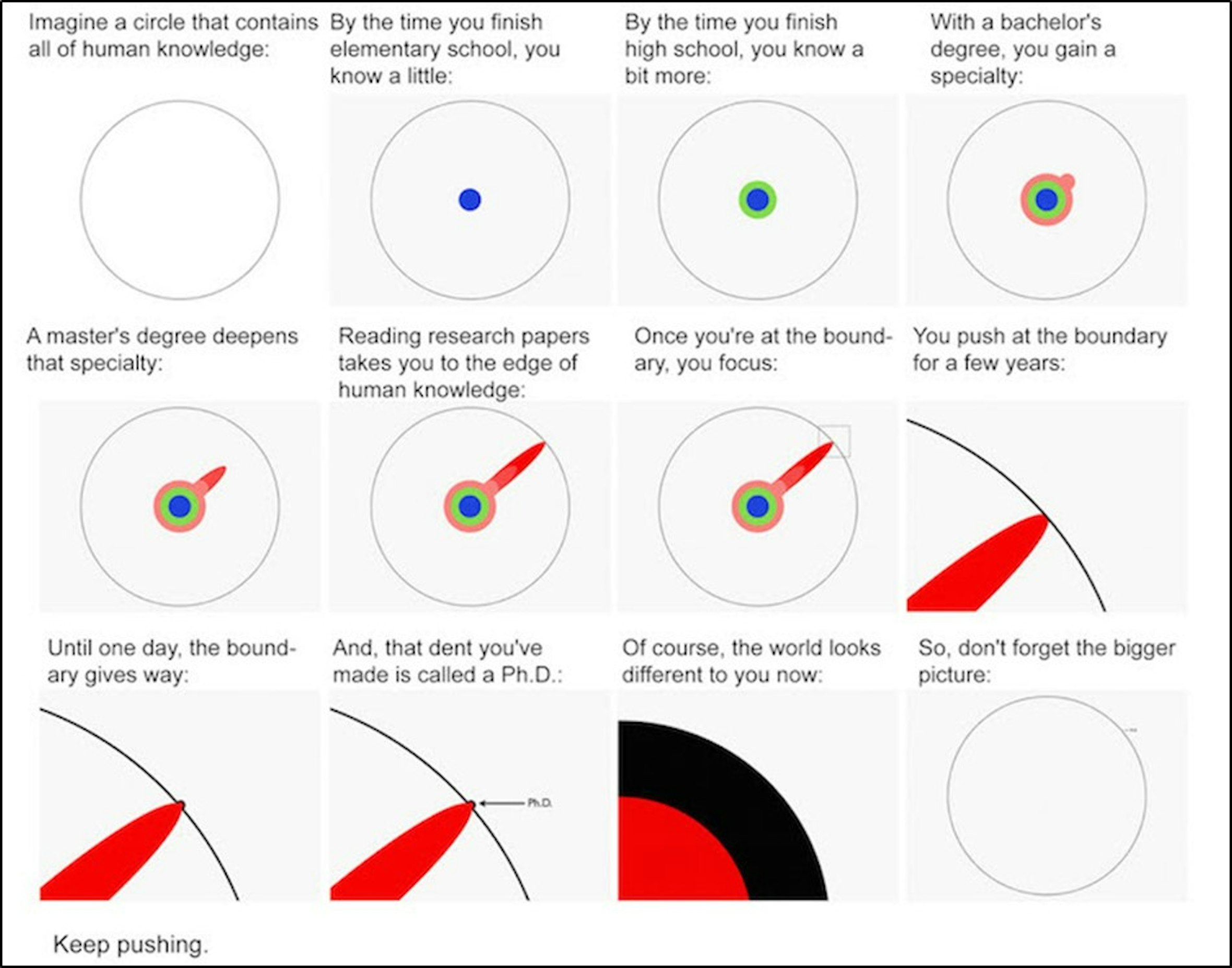 Photo: Matt Might | https://matt.might.net/articles/phd-school-in-pictures/ | All rights reserved
Photo: Matt Might | https://matt.might.net/articles/phd-school-in-pictures/ | All rights reservedFor some young scholars, this perspective on the nature of a Ph.D. may diminish the significance of our contributions to the scientific community. However, there are those of us, like myself, who find solace in this viewpoint. Embracing the idea that our Ph.D. research represents a small yet meaningful step toward pushing the boundaries of knowledge further can be oddly comforting. After all, the smaller the contribution we make, the smaller the chance of us inadvertently messing it up, right? (Ah, and here we encounter another classic trait of Ph.D. students: the infamous imposter syndrome!)
In the realm of Ph.D. studies, along with great specialization comes significant responsibility. As we delve deeper into our research fields, we find ourselves immersed in a community of fellow scholars and effortlessly employing technical terminology to discuss our work. Within the walls of academia, this may feel second nature, but it only takes a family lunch or a gathering with friends to realize that we often stumble when attempting to convey our research to those outside the academic sphere.
This is a problem, not only because it makes us look obnoxious in front of our friends and family but also because it shows that we cannot confine our scientific production to the walls of the university. We must be able to adapt our communication skills to spread the novelty of the science we produce to the public beyond academic bulwarks. Media channels, policymakers, and taxpayers are among the audiences we need to present our results to, in an accessible and understandable format. We can produce the top-notch, high-quality science that we are so committed to, but if we fail to share that knowledge in a reachable way, we will confine our efforts to the boundaries of the academic world. This unfortunately contributes to pushing academia and society away from each other, crystalizing this separation of worlds instead of democratizing access to science.
I have been struggling with communicating my research since the beginning of my Ph.D., and now, toward the end, it has been more difficult than ever to find a good, clear, and effective answer to the question “What is your research about?” The problem is not that I am unable to explain it. If you give me three hours (or even more), I can definitely go on and on about the wonders of the relationship between federalism and democracy, the horrors of democratic breakdown, and the types of political incentives promoted by different types of political systems… But, if you are not interested in any of those topics, you will probably get bored with my speech after five minutes.
Scientific communication has been a concern for me also on a personal level. How many times have I seen brilliant research projects diminished by poor communication skills? Academic conferences can be a great networking locus, but boy, they can bore you to death due to the lack of presentation skills! Furthermore, how many scholars, in different levels of seniority, struggle deeply with delivering presentations, and face severe anxiety circumstances every time they have a presentation, a class, or an interview to perform?
It should not be like this. There must be another way to go beyond the academic frontiers and communicate research in a professional, effective, and relaxed way. In the same way we, as young scholars, are trained in methods, theories, and techniques, our communication skills should also be trained.
So, how do we break free from this cycle of academic tunnel vision and become the captivating researchers we were meant to be? It's time to venture beyond the confines of the ivory tower and embrace the world of public outreach! Imagine a world where we can explain our research in a way that even your grandma would understand it. A world where you can spark curiosity, ignite imaginations, and leave people begging for more. It's not a distant fantasy. It's within your grasp!
The University of Innsbruck promoted the “Ph.D. Impact: Aurora Master Class on Public Outreach for Doctoral Candidates” program as part of the Aurora partnership of like-minded European universities, from 5 to 8 June 2023. Together with three other colleagues from different fields of study, those participating were selected to travel to Reykjavik, Iceland, and dig deeper into the universe of scientific communication. In a very intense program, our mornings were dedicated to learning new tools and techniques to communicate our research in accessible, interesting, and engaging ways, such as storytelling, cinema and television, and podcasting.
During the workshops, we had the chance to discuss the importance of advertising what we do in an effective and stimulating way with experts in scientific communication and colleagues from all over Europe so as to guarantee professional opportunities in the near future. For example, how we present ourselves on LinkedIn can be decisive in the type of job opportunities we receive. If you focus on the specificities of your research field, you may attract niche-related offers. On the other hand, by focusing on your skills and broadening the demonstration of your experiences, you will probably attract broader offers, even from outside academia. It all depends on what you plan for your next professional step. Moreover, promoting what you know and what you would like to do in the future demands self-reflection on where you are and where you want to be in your career. Interestingly enough, communicating our research is also a process of introspection and soul-searching.
Finally, during my time in Iceland for the Ph.D. Impact program, in the afternoons we had of condensing years of research into concise three-minute presentations. The 3-Minute Thesis Competition, pioneered by the University of Queensland (Australia), challenged us to distill the essence of our research in an accessible, engaging, and enjoyable manner. It was an exercise that aimed to showcase the excellence and excitement of our work.
Over the course of three days, we worked tirelessly to compress years of hard work, achievements, and setbacks into only three minutes. With the guidance of skilled and experienced science communicators, we honed our presentations, crafting catchy titles and finding the “hook” - the most captivating and relatable aspect of our research that would grab the audience's attention.
The process was both challenging and immensely enjoyable. We, a diverse group of Ph.D. students from different universities, nationalities, and fields, formed strong bonds as we supported and collaborated with one another to highlight the impact of our research beyond the confines of academia. When the moment of the competition arrived, nerves were running high, but so was the excitement. Each competitor poured their hearts and souls into their presentations, showcasing not only the hard work invested but also the passion they held for their respective topics and results. It was a true embodiment of the essence of science - the thrill of creating something new, relevant, and captivating while effectively communicating it to the wider society.
Although I did not win the competition (I must admit, my nerves got the best of me and I spoke too quickly), I returned with something even more valuable - a renewed sense of purpose. I now carry the mission to disseminate my research findings beyond the confines of the university walls and to share the significance and enjoyment of public outreach with fellow scholars.
The article was first published on the blog of the Department of Political Science, University of Innsbruck.
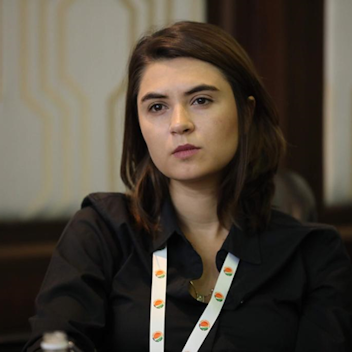
This content is licensed under a Creative Commons Attribution 4.0 International license.

 Maja Sahadzic
Maja Sahadzic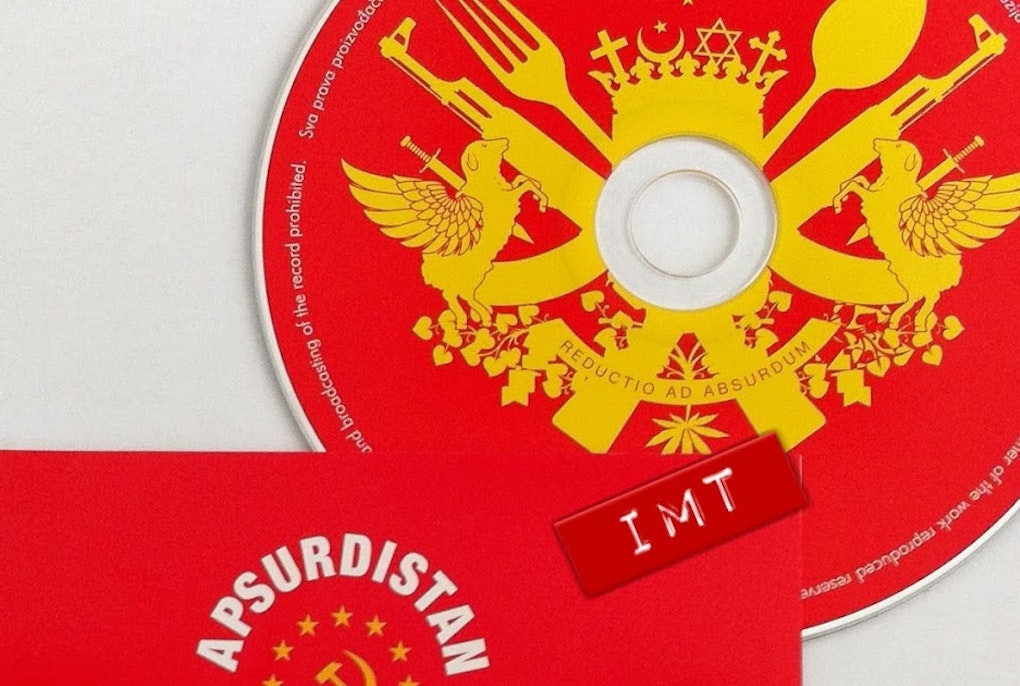
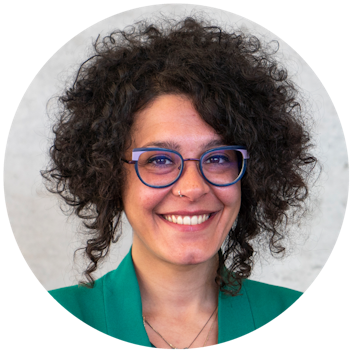 Arianna Piacentini
Arianna Piacentini
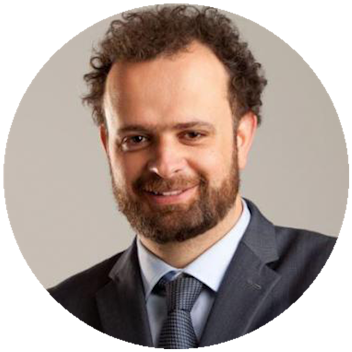 Oreste Pollicino
Oreste Pollicino